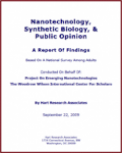Public Perceptions

A new editorial in the journal Nature is calling for $20 million to $30 million in research over the next ten years to study the potential ecological risks of synthetic biology.
Join us to discuss how well we have managed the risks associated with advances like nanotechnology and synthetic biology.
Europeans consider genetically modified food to be probably unsafe or even harmful, they are largely unaware of synthetic biology--only 17% of Europeans have heard of the science.
Super Cell is a fictional supermarket offering speculative products, which are all based on synthetic biology.
A new poll conducted by Hart Research Associates and the Synthetic Biology Project finds that two-thirds of Americans think that synthetic biology should move forward, but with more research to study its possible effects on humans and the environment.
Researchers at the J.C. Venter Institute announced the creation of a bacterial cell controlled by a synthesized genome, a significant milestone in the emerging field of synthetic biology. But did anyone in the public listen?
The August 25 Seminar on the margins of the 2010 meetings of the BWC marked the culmination of 3 years of engagement on synthetic biology. The Seminar briefed the BWC community on non-security challenges raised by synthetic biology and illustrated how they are being dealt with.
SPLICE is a theatrical depiction of rebellious scientists manipulating DNA. Share your thoughts about the movie.
A new report defines the criteria for a new technology assessment function in the United States, emphasizing the need to incorporate citizen-participation methods to complement expert analysis.
The rapidly growing network of do-it-yourself biologists has attracted the attention of both innovators, looking to mobilize a network of creative minds, and security experts, worrying about the proliferation of new capacities to create biological organisms.

90 percent of Americans think that the public should be better informed about the development of cutting-edge technologies.
For the fourth year in a row, Hart Research and the Project on Emerging Nanotechnologies conducted a representative national telephone survey on public awareness of nanotechnology, and for the second year in a row the public was also asked about synthetic biology.
David Rejeski discusses "Public Perceptions On The Technological Frontier" at the National Academies.